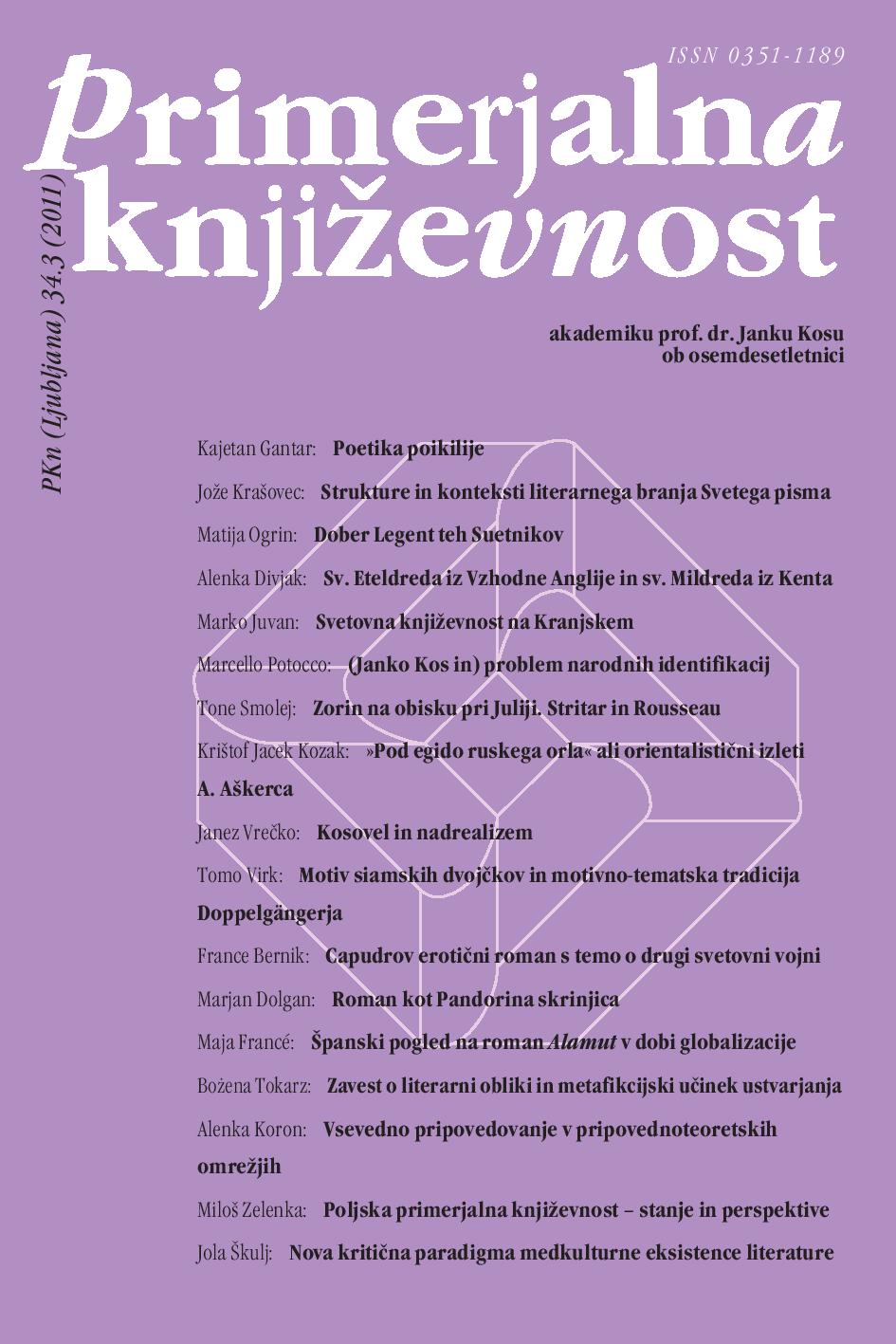Omniscient Narration in a Network of Narrative Theories
Keywords:
narratology, narration, narrative structure, omniscient narrator, poeta vates, Culler, Jonathan, Sternberg, Meir, Martínez, MatiasAbstract
Since modernism, omniscient narration has often been attacked, but it has rarely been studied and understood, despite its role in narrative discourse and metadiscourse. This article examines the polemics between two narrative theorists, Jonathan Culler and Meir Sternberg, who diverge on the nature of narrative omniscience and the usefulness of the concept for the study of narration. It also deals with the discussion of omniscient narration and the omniscient narrator by Matias Martínez and Janko Kos to shed light on the background and scope of their approaches. The author approves of Martínez’s argumentation and condensation of the main characteristics of omniscient narration into two points: (1) that the three main features that generally define omniscient narration (i.e., temporal and spatial omnipresence, and insight into the consciousness of other persons) can all be derived from one fundamental trait that information in omniscient narration is not subjected to the usual limitations of empirical perception; and (2) that the reader accepts the assumptions of the omniscient narrator without these being quasi-empirically accepted as appropriate. – It is interesting, that Martínez and Kos arrive at a similar result despite choosing to approach the subject from very different directions. Martínez is informed by a neo-Kantian formal approach and the theory of a formal mythos, whereas Kos bases his intellectual-historical approach on Hegel. Kos equates the content of the discourse of the omniscient narrator with the discourse of the authorial narrator, who is in possession of the whole »truth« about his narrative world; this truth corresponds to the intellectual-historical image of the author’s world. Martínez speaks about certainty, which he also conceives as the truth that does not need empirical evidence, but only within the frameworks of the fictional world. – Compared with all the other authors (Culler, Sternberg, and Martínez), Kos never expounds on the connection of the omniscient narrator with the fiction; for him, the truth has an irreducible moral, social, and metaphysical sense. Therefore his attitude seems closer to Sternberg than Culler, who is more formal in his approach. However, Kos also differs from Sternberg in his dealings with typologies, which for Sternberg are incompatible with the Proteus Principle. Contrary to Culler, all the other authors still consider the concept of omniscient narration a rather useful term for contemporary critical practice. A wide range of different attitudes to omniscient narration and the omniscient narrator show that the concepts clearly still provoke lively disagreements. A renewed debate on their role in fiction within a network of similar, but partly controversial, issues is therefore to be expected.References
Capote, Truman. Hladnokrvno. Prev. Maila Golob. Ljubljana: Mladinska knjiga, 2007.
Culler, Jonathan D. »Omniscience.« Narrative 12.1 (2004): 22–34.
Dolinar, Ksenija (ur.). Literatura. Ljubljana: Cankarjeva založba, 1977.
Flaubert, Gustave. Gospa Bovary. Prev. Suzana Koncut. Ljubljana: Mladinska knjiga, 1998.
Fludernik, Monika. An Introduction to Narratology. London, New York: Routledge, 2009.
Heziod. Teogonija; Dela in dnevi. Prev. Kajetan Gantar. Ljubljana: Modrijan, 2009.
Joyce, James. Umetnikov mladostni portret. Prev. Jože Udovič. Ljubljana: Cankarjeva založba, 1966.
Kmecl, Matjaž. Mala literarna teorija. 4. popr. in dop. izd. Ljubljana: Mihelač in Nešović, 1995.
Koron, Alenka. »Pripovednoteoretski vidiki v Kosovih literarnoteoretskih delih«. Primerjalna književnost 24. Posebna številka (2001): 189–215.
Kos, Janko. Literarna teorija. Ljubljana: Državna založba Slovenije, 2001.
– – –. »Novi pogledi na tipologijo pripovedovalca«. Primerjalna književnost 21.1 (1998): 1–19.
Martínez, Matías. »Allwissendes Erzählen.« Antropologie der Literatur: Poetogene Strukturen und ästetisch-soziale Handlungsfelder. Ur. Rüdiger Zymner in Manfred Engel. Paderborn: Mentis, 2004. 139–154.
Martinez, Matias in Scheffel, Michael. Einführung in die Erzähltheorie. 3. izd. München: Beck, 2002.
Pasternak, Boris L. Doktor Živago I, II. Prev. Janko Moder. Ljubljana: Cankarjeva založba, 1967.
Prince, Gerald. Dictionary of Narratology. Popr. izd. Lincoln, London: University of Nebrasca Press, 2003.
Rimmon-Kenan, Shlomith. Narrative Fiction. 2. izd. London, New York: Routledge, 2002.
Sternberg, Meir. »Omniscience in Narrative Construction: Old Challenges and New.« Poetics Today 28.4 (2007): 683–794.
Sveto pismo stare in nove zaveze: Slovenski standardni prevod iz izvirnih jezikov. 2., pregled. izd. Ljubljana: Svetopisemska družba Slovenije, 1997.
Vidmar, Živa, Stergar, Katja in Butina, Darja (ur.). Literatura. Ljubljana: Cankarjeva založba, 2009.


